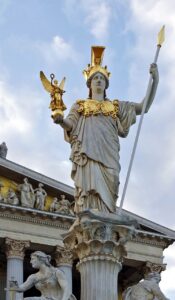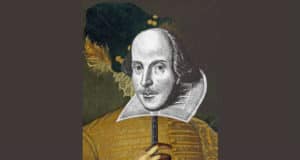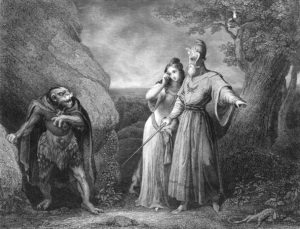Why Would Anyone Need to Fake Shakespeare’s Authorship?
by Tom Regnier
Writing anonymously or under a pseudonym was commonplace in Elizabethan England. Archer Taylor and Frederic J. Mosher, in their seminal book on pseudonymous writings, The Bibliographical History of Anonyma and Pseudonyma (University of Chicago Press, 1951), stated: “In the sixteenth and seventeenth centuries, the Golden Age of pseudonyms, almost every writer used a pseudonym at some time or other during his career.”
Pseudonyms were important because a person could be punished for saying things that displeased the authorities. For example, a man with the sadly fitting name of John Stubbs had his hand cut off because he wrote that Queen Elizabeth I was too old to marry. People in the nobility had an additional reason for hiding their identities if they wrote poetry, which was considered frivolous, or plays, which were considered beneath a nobleman’s dignity if performed in the public theaters.
As the anonymous author of The Arte of English Poesie (1589) stated: “I know very many notable gentlemen in the court that have written commendably and suppressed it … or else suffered [allowed] it to be published without their own names to it, as if it were a discredit for a gentleman to seem learned and to show himself amorous of any good art.”

So the question, really, would not be why someone would “fake” Shakespeare’s authorship, but why someone would use the name “William Shakespeare” as a pen name, and possibly also use the man from Stratford himself as a frontman (his surname was spelled “Shakspere” on his birth and death records).
Scholars have determined, by the way, that while the name “Shakespeare” may sound exotic to us, it was not an especially rare family name in 16th century England. Researchers have found references to a fair number of apparently unrelated people with that surname or some variation of it. “William,” furthermore, was an extremely common given name then (even more than today); one orthodox scholar estimated that 22% (more than one fifth) of all Englishmen during that era used some form of “William” as a first name, thus making it a convenient generic part of any pen name.
It is thus very plausible to suppose that an aristocrat who wanted to write poems and plays without being publicly linked to them might use a pseudonym such as “William Shakespeare” to hide his identity. “Shakespeare” seems exactly the kind of vivid and dashing name that would have lent itself to use as a pseudonym. It may have been meant to invoke Athena (Pallas or Minerva), the Greco-Roman goddess of wisdom (also viewed during the Renaissance as a patron of the arts), who according to legend came into the world brandishing a spear and is very often depicted that way.
But is there any reason to doubt that Shakspere of Stratford was the author? While we have about 90 documents about him from his lifetime, they identify him merely as a mundane businessman. A few indicate he was a sometime actor and theatre shareholder. None of them identify him as a writer of any kind. There is no evidence he ever went to school (it is merely assumed that he went to the Stratford grammar school), nor that he ever wrote a letter or even owned a book. His parents were illiterate, as were his daughters. His six accepted signatures suggest he had difficulty writing his own name.
People in the 19th century or more modern times are far from the first to doubt the identity of whoever wrote the works of “Shakespeare.” The authorship question dates back more than 425 years to Shakespeare’s own era. Dozens of doubts were published during the lifetime of Shakspere of Stratford, going back to at least the early 1590s, decades before he died in 1616. At least five publications between 1604 and 1616 strongly imply that the author “Shakespeare” was already dead — years before the Stratford man died.
Doubts about the identity of the author “Shakespeare” began arising more than 30 years before the Stratfordian theory itself was ever proposed in print. That did not occur (as noted below) until the First Folio of 1623, published more than seven years after Shakspere died. See generally Wildenthal, Early Shakespeare Authorship Doubts (2019).
Diana Price, in her book Shakespeare’s Unorthodox Biography, pointed out that there are no references during Shakspere of Stratford’s lifetime (1564–1616) — zero — in which anyone clearly and personally associated him with the works being published and performed under the name “Shakespeare.” See also Ramon Jiménez’s compelling article, “Ten Eyewitnesses Who Saw Nothing.” One might argue about a tiny handful of highly ambiguous references (two or three at most), one of which actually seems to mock the idea that the actor Shakspere was any kind of writer; each also raises authorship questions (again, see Wildenthal).
Even Sir Stanley Wells, one of the world’s leading Shakespeare experts — and an orthodox scholar who scathingly rejects authorship doubts — has concurred with this basic point. In a 2013 essay, Wells wrote that among “the mass of evidence” from Shakspere’s lifetime, “there is none that explicitly and incontrovertibly identifies [the author ‘Shakespeare’] with Stratford-upon-Avon” (emphasis added). It is only in the posthumous First Folio of 1623 that a connection seems to be drawn between Shakspere of Stratford and the works of “Shakespeare.” And even then, the linkage is highly ambiguous and cryptic in multiple ways. And don’t even get me started on the bizarrely suspicious Stratford Monument (see two of the best discussions, by Richard Whalen and Alexander Waugh).
The 1623 Folio, very suspiciously, seems to raise an issue about whether the author had “small Latin and less Greek.” That line, often read carelessly and inattentively, is actually phrased as a curiously conditional comment (“though [if] thou hadst … I would not seek …”) (for a powerful recent analysis of its broader context, see Professor Roger Stritmatter’s two-part article, in 2017 and 2018). But it may have teasingly suggested, at one level of meaning, a man of little education who somehow created great literary works out of sheer native genius. Some modern scholars who reject authorship doubts seem to have been suckered by Ben Jonson’s obvious word games in the Folio, to the point of overlooking the evidence of the works themselves.
For example, Louis B. Wright, onetime director of the Folger Shakespeare Library, once claimed that Shakespeare’s plays “show no evidence of profound book learning.” That claim has always struck me as odd, if not absurd. I have taught a law school course on Shakespeare’s knowledge of law. There are around 50 books on that specialized subject alone, and that merely scratches the surface of the many books and articles written about the author Shakespeare’s deep understanding of a wide range of other technical subjects.
These include medicine; hunting, falconry, and horsemanship (all three highly restricted aristocratic pastimes in Shakespeare’s day, not activities in which a middle-class commoner, even if quite successful, could have indulged); military life, tactics, and equipment; philosophy; Italian styles and traditions of theatre (such as commedia dell’arte) rarely if ever seen in England in that time; many other intimate aspects of Italian culture, geography, art, customs, and language; nautical life and navigation; classical mythology; folklore; biblical references; botany (plants), husbandry (animals), and gardening; music; heraldry (another aristocratic preoccupation); precious stones; Greek drama; and even typography — not to mention fluency in several foreign languages (apparently including Latin, French, Italian, and Spanish), with apparently some knowledge of Greek and Hebrew as well.

Considering the huge disjunction between Shakspere’s apparent lack of education or foreign travel — compared to the level of literacy, access to books, and familiarity with foreign languages and cultures that the writer of the works clearly must have had — it is natural to suppose that “Shakespeare” was the pseudonym of a highly educated and well-traveled person who, like many Elizabethans, used a pen name to keep his identity secret.
Abundant circumstantial evidence points specifically to Edward de Vere, 17th Earl of Oxford (1550–1604), as by far the most likely person to have been writing as “William Shakespeare.”
Oxford was a generous patron of the arts and literature to whom dozens of books were dedicated. He was a man of the theatre, sponsoring both men’s and boys’ acting troupes at various times. His father sponsored players when he was a boy, so he would have grown up exposed to the theatre. Oxford leased Blackfriars Theatre for his boys’ troupe in the 1580s.
Oxford toured Italy extensively during 1575–76, along with other parts of continental Europe. He visited, often for extended periods, most of the cities in which Shakespeare’s Italian plays are set. That 1589 book mentioned above, The Arte of English Poesie, identified “Edward Earl of Oxford” as the “first” among “noblemen and gentlemen … who have written excellently well, as it would appear if their doings could be found out and made public with the rest.” Francis Meres, in a book published in 1598, called Oxford one of the best writers of comedies.
The 1589 and 1598 references just mentioned are only two among half a dozen or so known praises of Oxford’s literary prowess, by his own contemporaries during the late 16th and early 17th centuries. Modern scholars who dismiss or disparage Oxford are displaying anachronistic disregard for what writers of his own time said, thus violating the most basic rule of serious historical study.
Careful studies of Oxford’s early known poems suggest very strongly that they amount to the “juvenilia” of Shakespeare. While generally inferior to the mature Shakespearean works (on which account they are foolishly dismissed by some), they contain hundreds of parallels in diction, vocabulary, figures of speech, theme, topic, style, and motif, with the plays and poems of “Shakespeare.” Many of these connections are strikingly compelling.
These poetic parallels corroborate numerous additional linkages between the Shakespeare canon and passages in Oxford’s private letters, hand-marked verses in his personal Geneva Bible, and often-obscure details of his personal and family life (see multiple citations below). The Oxfordian theory is thus confirmed, over and over again, by multiple, independent, and interlocking bodies of empirical evidence. It amounts to an astonishingly powerful circumstantial case. As any lawyer, prosecutor, detective, scientist, or historian worth her salt knows — and as I discussed in a lecture posted on YouTube in 2015 — “circumstantial” evidence is very often the most reliable and powerful form of evidence and proof we have.
It defies credulity to think the evidence supporting Oxford could all be mere coincidence.

In addition to Oxford probably needing to hide his identity because writing plays and poems was unseemly for a nobleman, he would have wanted to veil his authorship (or at least maintain polite public deniability about it) because his plays often satirized people in Queen Elizabeth’s court — most notably William Cecil (Lord Burghley), the queen’s powerful righthand man, who is mercilessly lampooned as Polonius in Hamlet.
Speaking of propositions that defy credulity, it is difficult to imagine a commoner like Shakspere of Stratford could have gotten away with impudent satire of such a powerful man. But we know for a fact that while Queen Elizabeth was often irked and sometimes outraged by Oxford’s misbehavior (she once locked him in the Tower of London for impregnating one of her ladies in waiting), she frequently forgave his trespasses, scandals, and faux pas. She knew him well and may have tolerated his “pushing the envelope” in ways that would have risked imprisonment or worse for most others.
Burghley was Oxford’s guardian when he was a boy, after his father died and he was forced into “wardship” under the legal control of the queen — an exploitative system by which Elizabeth robbed many of her nobles blind, as Nina Green and Bonner Miller Cutting have both superbly researched and written about (see also Cutting’s classic lecture on the subject). Burghley ran his own spy network and sent a servant to France to spy on his son studying there. Polonius in Hamlet does exactly the same thing to his son Laertes. The reference to “young men falling out at tennis” in Hamlet may refer to a notorious quarrel on a tennis court between Oxford and Sir Philip Sidney.
Note that Hamlet was not published until after Burghley’s death in 1598. Curiously enough, it appears no “Shakespeare” play was published with any name attached until that very year. If Oxford had been publicly acknowledged as the author, the connection between Burghley and Polonius would have been intolerably obvious. In the First Quarto of Hamlet, this character is not called “Polonius” but rather “Corambis”: an obvious and rather vicious pun on Burghley’s motto, “Cor unum, via una” (“One heart, one way”). “Corambis” suggests “double-hearted” or “two-faced.” That was probably too blatant an indication that Corambis was based on Burghley, so the name was changed to Polonius in the Second Quarto and First Folio versions of Hamlet.
Burghley also became Oxford’s father-in-law. While it’s impossible to know for sure, Burghley and the queen may have coerced Oxford into his difficult marriage with Burghley’s daughter, Anne Cecil. All this may explain the playwright’s conflicted contempt for Polonius, whom Hamlet resents and (perhaps by accident) kills. Hamlet’s love interest, of course, is Polonius’s daughter Ophelia, for whom Hamlet also seems to have conflicted feelings. To be sure, the play depicts Hamlet’s deep love and grief when Ophelia dies, raising interesting questions. No one suggests the author was rigidly copying his life, just that he may have drawn dramatic inspiration from it. Hamlet was probably written and then revised much later (we have ample evidence of revisions, as noted above).
In 1588, Anne died tragically young (not unlike Ophelia), after 16 years of marriage. She bore Oxford three daughters. His likely guilt over earlier accusing her of infidelity, followed by some degree of reconciliation and then Anne’s untimely death at 31, could go far to explain powerful themes in several Shakespeare plays, and may shed light on Ophelia’s depiction.
Just as Hamlet (a young man) is captured by pirates and left on the shores of Denmark, Oxford in 1576 (age 26, returning to England from continental Europe) was captured by pirates and left on the shores of England. Both were sea-bound for England when captured. No such incident appears in any known source for Hamlet, so it seems to have been an original touch by the playwright — Oxford? Hamlet writes to Claudius that he was “set naked on your kingdom.” The French ambassador likewise wrote that Oxford was “left naked, stripped to his shirt.” One of Oxford’s servants wrote decades later, in a poem about the incident, “Naked we landed out of Italy, Enthrall’d by pirates ….”
The list of parallels between Oxford’s life and events in Shakespeare’s plays goes on and on — there’s far too much to explore here. See Mark Anderson’s scholarly and exhaustively researched biography of Oxford, “Shakespeare” By Another Name (2005). Two short summaries are Ramon Jiménez’s “The Case for Oxford Revisited” and my own “Top Reasons Why Edward de Vere Was Shakespeare.”
The most common argument made against Oxford as the true Shakespeare is that he died in 1604, before some of the plays were allegedly written. This argument has been thoroughly refuted by, among others, Richard Whalen in his article “A Dozen Shakespeare Plays Written After Oxford Died? Not Proven!” Orthodox Stratfordian scholars themselves are deeply divided on this subject. Some have conceded, in moments of candor, that the entire orthodox dating scheme amounts to circular reasoning, built around the a priori assumption that Shakspere of Stratford was the author. Leaving aside Henry VIII (widely agreed to be co-authored by John Fletcher, which could easily have occurred posthumously), a leading orthodox dating scheme, in The Pelican Shakespeare (Alfred Harbage ed. 1969), provides date ranges extending before 1604 (in most cases well before 1604), for every single canonical play aside from The Tempest.
Leaving aside the complicated “co-authorship” issue (which also deeply divides orthodox scholars), the two Shakespeare plays most commonly alleged to have been written after 1604 are Macbeth and The Tempest. Each has what some have argued are references to events that occurred after 1604.
A reference to “equivocation” in Macbeth is said to refer to the Gunpowder Plot of 1605, after which the Jesuit doctrine of equivocation became a buzzword in England. But equivocation was a centuries-old doctrine at that time and was much discussed during the trials of Edmond Campion in the 1580s and other alleged heretics in the 1590s. Both Lord Burghley, Oxford’s father-in-law, and Anthony Munday, Oxford’s secretary, wrote treatises on the subject. So Oxford did not have to live until 1605 to know about it. (See also my chapter on equivocation in the 2016 Kindle ebook, Contested Year.)

As for The Tempest, the argument is that some language about the shipwreck is taken from William Strachey’s description of the wreck of the Sea Venture in 1609. But research by Professor Roger Stritmatter and Lynne Kositsky, in a book even orthodox scholars have praised, shows that Strachey himself borrowed the imagery from much earlier works, such as Richard Eden’s Decades of the New World, published in 1550. Besides, Strachey’s letter was not published until 1625, long after Shakspere of Stratford died, and no one has explained how the Stratford man could have had access to it.
All in all, the 1604 issue actually works in Oxford’s favor. It is the Stratfordian theory, very ironically, that suffers from much more severe “1604 problems” — and several “1616 problems” as well, including the multiple published indications that the author “Shakespeare” died years before 1616, and seemingly right around 1604, as Wildenthal (pp. 60–62 & nn. 49–54), among others, has discussed. No books or events dating after 1604 have ever been proven to be referenced in Shakespeare’s writings. All that opponents of Oxford can really offer on this score are the references to equivocation and shipwrecks — which, as explained above, may easily derive from much earlier events.
In sum, this popular and perennial “1604 objection” to the Oxfordian theory is a classically misleading “silver bullet” type of argument that collapses under scrutiny.
The case for Oxford as the true “Shakespeare” is fascinating — and as you can probably tell by now, far more complex than can easily be summarized here. Much more information can be found at the website of the Shakespeare Oxford Fellowship, a non-profit organization, of which (full disclosure) I am a former president. You can see my video presentation on the authorship question on YouTube:
Editorial Note: This essay was published on the SOF website by Tom Regnier on February 8, 2020. He intended to go back and edit, update, and supplement it. After Tom died in April 2020, the essay was edited, updated, and supplemented in June 2020 by Bryan H. Wildenthal, Tom’s successor as SOF Website Content Editor and colleague for several years on the SOF Board of Trustees.

Tom Regnier (1950–2020) earned his J.D. summa cum laude in 2003 at the University of Miami School of Law, where he taught “Shakespeare and the Law” for many years as an adjunct professor. He earned his LL.M. in 2009 at Columbia Law School, where he was a Harlan F. Stone Scholar. He also taught at Chicago’s John Marshall Law School. He became a prolific independent Shakespearean scholar, combining his interests in Shakespeare and the law. He served as President of the SOF (2014–18) and was honored as Oxfordian of the Year in 2016. You can read here about his final public lecture, on the centennial of the Oxfordian theory, with links to his obituary, his major writings and speeches, and much additional information.
[published Aug. 18, 2019, updated 2021]
Membership dues cover only a fraction of our budget, including all our research, preservation and programming. Please support the SOF by making a gift today!
Blue Boar Tavern: Wassail Q&A
Tuesday Dec. 17, 8pm E / 5pm P
Sign up below for event invites!
